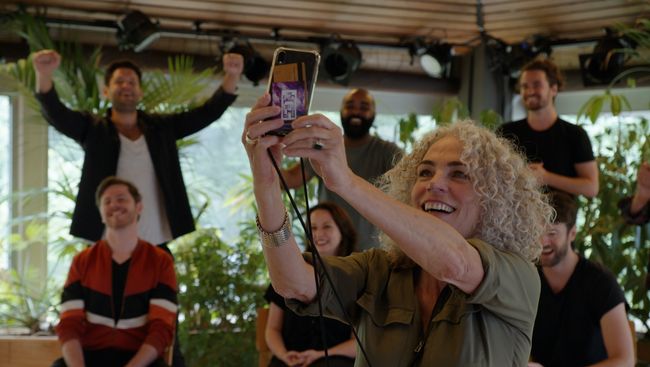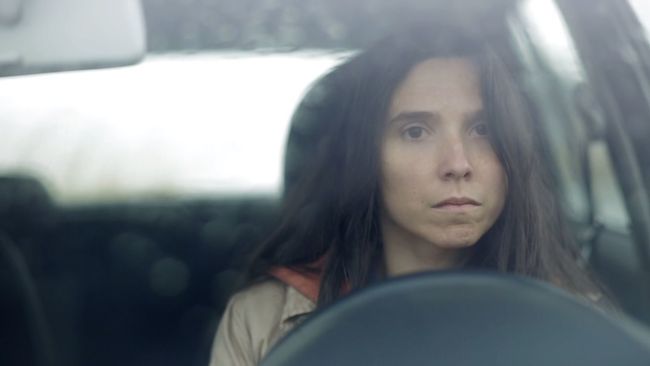Alex Gibney, his tips
26 November 2019
Insights of the documentary grandmaster
Insights of the documentary grandmaster
On Sunday, 24 November, Oscar winner Alex Gibney presented in an exclusive session at IDFA to a room full of up-and-coming film talent what his most important learning moments were on documentary level. In the evening session he discussed, on the basis of excerpts from Mea Maxima Culpa, Enron: The Smartest Guys in the Room and Going Clear: Scientology and the Prison of Belief, the choices he makes as a documentary director, and why.
# 1 The production and display options for documentaries have been improved
"The two biggest differences between the past and the present are that documentary makers are now really in top form, in a way that was previously impossible. Moreover, you can now tell stories without the enormous production equipment of a studio. The means of production have become radically more accessible and cheaper. " With a modest camera, you can already make the most beautiful things. The other major change is on the part of the exhibitor. "Today, there are commercial platforms where the documentary format comes into its own much better because it brings the content directly to the viewer. The new streaming platforms are committed to promoting really good storytelling."
# 2 A documentary film is FILM
"Before I broke through, I was lucky to be involved as a producer with The Blues, a documentary series by Martin Scorsese. Scorsese did an episode, Wim Wenders one and Antoine Fuqua as well." All of them are directors who earned their spurs in the field of feature films, and who approached the subject in a visual way. "It was a huge learning experience for me. At that time, the documentary genre was much more rigid than today. I worked according to a booklet with rules but found out in this series that the booklet was completely outdated. When I got these people working I saw that you can also approach the reality that takes place before your eyes as cinema. My breakthrough film about Enron would not have been possible without the lesson of The Blues: how to focus on a subject, but at the same time bring it as filmically as possible. Documentaries are actually exactly the same as feature films. The only difference is that you only write the script at the end of a documentary. In the editing room. "
# 3 The montage makes the film
"I watch Gimme Shelter every nine months: the Rolling Stones music documentary that is transformed into a murder mystery by editing. Layer by layer, deeper and deeper, from playful to sinister. Editors usually don't get enough credit." And Gibney knows, because he started his career as an editor of feature films. "Sometimes I write an outline in which I outline the structure of the film: when do I reveal what? That should not be too fast, but which mysteries are the most important? And on the way there you have to put some hints on." That does not mean that the film 'takes shape' on paper. "The assembly process is the way to figure out what the best structure is."
# 4 A documentary is a kind of detective
"I am a huge fan of crime films and detective novels, such as those by Dashiel Hammett and Mickey Spillane." In that respect, Gimme Shelter was an eye opener for Gibney, because he followed the laws of a genuine genre film: in fact it is a heist film. "My stories tend to be about criminals and criminals. I'm interested in how criminals work. Because if you figure that out, then you can stop the crime next time.
# 5 Tackle controversial topics instantly
Another important lesson: if you tackle a controversial topic and expect legal opposition, then it is nice if you have a large party, such as in the case of Going Clear HBO, behind you with a legal team. They have the resources and the money. "But bring the expected difficulties immediately open and exposed or table, and not when the shit hits the fan".
# 6 Think of people in your documentary, but put the viewer first
"The characters determine how I make the films that I make. When I'm in the editing room, I imagine that they are sitting next to me. So that I can defend every cut I make. Because that is what film making comes down to defending your choices. At times you will have to be harsh and cruel, for the truth that requires. While editing Taxi to the Dark Side I turned out to be forgiving about the soldiers who had committed atrocities. That felt like cheating. So I put a number of cut-out scenes back with their violence. Because in the end I am accountable to the public. "
# 7 Keep an open mind
"The most important thing I learned as a maker is that you have to dare to change your mind. I followed a strict plan, did everything according to the rules and what did it deliver? A bad documentary. In the research phase I come across unexpected things, which sometimes the film or the theme change. You have to keep an open mind. The willingness to be surprised and shocked. "
# 8 You don't make a movie on your own
"Jean-Luc Godard is known to be in the editing room and tapping the editor's shoulder if he had to make a cut. That is exactly the opposite of how I work. I give my editors complete freedom. One of the reasons why I can make a lot of films is because they are collaborations Film is a cooperative medium There are people who think that the director does everything I don't believe in. I don't think I am a good cameraman, so I'd rather hire very good professionals in. I started my film career under Sam Goldwyn Jr. A nice guy, but his great weakness was that he only wanted to work with directors he could manage, who were less good than him, while you have to do the opposite. You have to work with people who are much smarter and much more talented than you. And create an environment where you can let excel."



